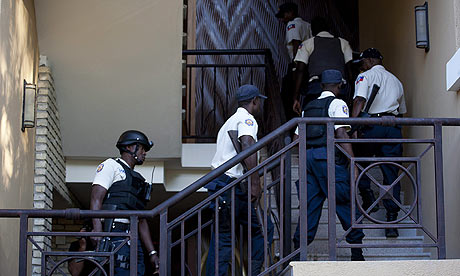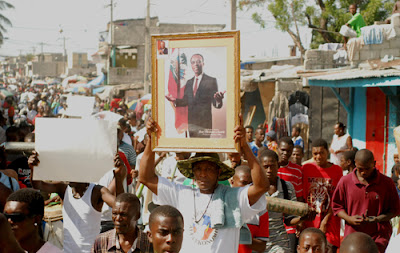January 19, 2011 7:36 PM

The Real Power Behind Baby Doc
Exiled dictator Jean-Claude Duvalier made a spectacular return to Haiti, where he's facing charges. But no one seems to be talking about who the real culprit may be - his reviled wife Michele. Here's the stunning story of how a shopping spree caused a revolution.
When Jean-Claude Duvalier, the notorious Haitian dictator known as "Baby Doc," ended his 25-year exile this week, he made a surprise return to Haiti with an elegant woman on his arm. But it wasn't the same woman who was forced to flee alongside him a quarter century ago.Anyone who saw Ed Bradley's fantastic 1986 piece on the ouster of Jean-Claude Duvalier, probably wondered: Is that Michele? The one who refrigerated a room of the presidential palace so she could comfortably wear her fur coats in tropical weather? The one who pilfered millions of dollars from Haitian coffers for shopping sprees and parties?
Michele Bennett was a divorcee and mother of two when she married the young dictator and became the first lady of Haiti. As you'll learn in this classic "60 Minutes" piece produced by the late George Crile, Michele enlisted the Haitian TV network to promote her efforts to alleviate the extreme poverty of the Haitian people. But behind palace walls, Michele's story took a very different turn, and with it, turned Haitian history.
Jean-Claude Duvalier, who took the title "President For Life" at the age of 19, ruled the country from 1971 until 1986, the year this piece was broadcast. After being chased from Haiti by angry mobs, Michele and Jean-Claude spent years living in luxury on the French Riviera. The couple has since divorced, and Veronique Roy (pictured at left with Duvalier), is the female companion who arrived in Haiti on his arm this week.
Haiti's democracy in the balance
'Baby Doc' Duvalier's return does not change the basic issue for Haiti: only an election re-run can thwart foreign interference

-
- guardian.co.uk, Tuesday 18 January 2011 17.46 GMT
- Article history
 Haiti police go up the stairs at the Hotel Karibe in Port-au-Prince to take Jean-Claude 'Baby Doc' Duvalier into custody. Photograph: Andres Martinez Casares/EPA
Haiti police go up the stairs at the Hotel Karibe in Port-au-Prince to take Jean-Claude 'Baby Doc' Duvalier into custody. Photograph: Andres Martinez Casares/EPA
The return to Haiti – and now, possible arrest – of the infamous former dictator, Jean-Claude "Baby Doc" Duvalier, after 25 years in exile in the south of France, has made the headlines this week. But behind the scenes, the US state department and the French foreign ministry have been ratcheting up the pressure on the impoverished, earthquake-wrecked and cholera-stricken country of Haiti. The pressure is not to prosecute the dictator for his atrocities, as human rights groups such asAmnesty International and Human Rights Watch have recommended. The pressure is to force the government of Haiti to accept the decision of the United States and France as to who should be allowed to compete in the second round of Haiti's presidential election.
It is worth looking at the details of this international subversion of the democratic process in Haiti – just to see just how outrageous it is. The first thing to notice is how unusual it is for any electoral authority to change the results of an election without a recount of the vote. Imagine that happening in Florida in 2000, or Mexico in 2006, or in any close, disputed election with irregularities. It just wouldn't happen. There could be a recount and a new result; the original result could stand; or the election could be redone. But the electoral authorities don't just change the result without a recount.
Now, add into the mix that the electoral body seeking to change the result of the election is the Organisation of American States (OAS). More accurately, it is Washington, which controls the bureaucracy of the OAS in these situations (unless there is a lot of pushback from South America, as happened after the Honduran coup in 2009).
In fact, six of the seven members of the OAS "expert verification mission" are from the United States, Canada and France. France! Not a member of the OAS but the former slave-holding colonial power that was still forcing Haiti to pay for its loss of property (that is, the slaves who liberated themselves) until the 1940s. Apparently, the OAS couldn't find any experts in all of Latin America (though they found one from Jamaica) to review Haiti's election.
This is not a matter of political correctness; rather, it indicates how much Washington wanted to control the result of this OAS mission. These are the three governments that led the effort to topple Haiti's democratically elected president, Jean-Bertrand Aristide, in 2004. WikiLeaks cables released this week show that the United States also pressured Brazil to help keep Aristide out of Haiti after the coup. Since Aristide was, and remains to this day, the most popular politician in the country, the WikiLeaks cables show that Washington and its allies also worked to keep him from having any influence on the country from his forced exile in South Africa.
As it turns out, the OAS "experts" did a very poor job on their election analysis. They threw out 234 tally sheets, thus changing the election result. According to the OAS, the government candidate, Jude Celestin, was pushed into third place and, therefore, out of the runoff election. This leaves two rightwing candidates – former first lady Mirlande Manigat, and popular musician Michel Martelly – to compete in the runoff. The OAS has Martelly taking second place by just 3,200 votes, or 0.3% of the vote.
The first problem with the OAS mission's report is that there were more than 1,300 ballot sheets, representing about 156,000 votes, that went missing or were quarantined. This is about six times as many ballot sheets as the ones that the mission eliminated. Since these areas were more pro-Celestin than the rest of the country, he would very likely have come in second if the missing tally sheets had been included. The mission did not address this problem in its report.
The second problem is that the mission examined only 919 of the 11,181 tally sheets to find the 234 that they threw out. This would not be so strange if they had used statistical inference, as is commonly done in polling, to say something about the other 92% of ballot sheets, which they did not examine. However, this is not included in the leaked report.
Lacking the force of logic, the US and French governments are turning to the logic of force to get the result that they want. Journalism professor and author Amy Wilentz wrote this weekend in the LA Times:
"According to many sources, including the president himself, the international community has threatened Preval with immediate exile if he does not bow to their interpretation of election results."
These are not empty threats. Preval's predecessor, Aristide, was whisked out of the country on a US plane in 2004. And now the US ambassador to Haiti is making it clear, in mafia-godfather-style, that this is an offer he cannot refuse:
"US ambassador to Haiti Kenneth Merten said in an interview that the US government supports the OAS report and its conclusions. 'The international community is entirely unified on this point. There is nothing to negotiate in the report,' Merten said."
The French weighed in on Friday, AFP reports:
"France warned Haiti's government on Friday to respect a report by OAS poll monitors that is thought to call for President Rene Preval's preferred successor to drop out of the election race …"
So far, Haiti's Provisional Electoral Council (CEP) hasn't caved. But the pressure and threats are very intense. Some of it appears to come from hard-right Republicans, whose influence on foreign policy in the western hemisphere has remained strong under the Obama administration and has increased with their takeover of the House of Representatives. Rightwing activists such as Roger Noriega, who was involved in the 2004 Haitian coup as President Bush's assistant secretary of state for western hemisphere affairs, are among those fighting to control the runoff election in Haiti.
It is quite possible that the hard right was responsible for the leaking of the draft OAS mission report. On Monday, OAS secretary general Jose Miguel Insulza – embarrassed and angered by the leak, and probably also by Washington and France's gross disregard for Haiti's sovereignty and democratic rights– sought to downplay the mission's report:
"The report, Insulza said, is based on "calculations" and not results. "It's not in our power to give results," he told the Miami Herald. "We are not publishing any kind of results."
Of course, the obvious solution would be to re-run the election, since nearly three-quarters of registered voters didn't vote in the first round, reflecting the fact that the country's largest political party – not coincidentally, the party of Aristide – was arbitrarily excluded. But Washington and its allies don't want to take any chances that they could end up with a free and fair election in Haiti, which hasn't led to their preferred outcome in the very few times that it has been allowed.
• Editor's note: This article originally gave Jose Miguel Insulza's post erroneously as "secretary of state" of the OAS; this was amended to the correct title "secretary general" at 17:00 ET (22:00 GMT) on 18 January 2011.
>via: http://www.guardian.co.uk/commentisfree/cifamerica/2011/jan/18/haiti-usa
__________________________
Wednesday, January 19, 2011
The Return of Former Haiti's Democratically Elected President Jean-Bertrand Aristide Is Crucial for his Health
by Wadner Pierre
Former President of Haiti
19 January 2011 I would like to thank the government and the people of South Africa
for the historic hospitality, deeply rooted in Ubuntu, extended to my family
and I. Since my forced arrival in the Mother Continent six and a half
years ago, the people of Haiti have never stopped calling for my return to
Haiti. Despite the enormous challenges that they face in the aftermath of the
deadly January 12, 2010 earthquake, their determination to make the return
happen has increased. As far as I am concerned, I am ready. Once again I express my
readiness to leave today, tomorrow, at any time. The purpose is very clear: To
contribute to serving my Haitian sisters and brothers as a simple citizen in
the field of education. The return is indispensable, too, for medical reasons: It is strongly
recommended that I not spend the coming winter in South Africa’s because in 6
years I have undergone 6 eye surgeries. The surgeons are excellent and very
well skilled, but the unbearable pain experienced in the winter must be avoided
in order to reduce any risk of further complications and blindness. So, to all those asking me to return home, I reiterate my
willingness to leave today, tomorrow, at any time. Let us hope that the
Haitian and South African governments will enter into communication in order to
make that happen in the next coming days. United to the Haitian people, once again my family and I express
our sincere gratitude to the government and the people of South Africa.
About the author
- Wadner Pierre
- Je suis originaire des Gonaïves, departement de l'Artibonite,photojournaliste indépendant Haitien, j'ai écrit pour l'Inter Press Service (IPS) et le journal HaïtiLiberté. Contributeur et membre fondateur de Analiz Ayiti (HaitiAnalysis) le médias collectif. Wadner Pierre is a Haitian Photojournalist originally from the city of Gonaives, department of Artibonite. I currently live in United States for my studies, but I have eyes focused on what is going on in Haiti . I talk to people and I read everyday about what the ongoing on in ground of Haiti. I have been writting for theInter Press Service (IPS), Haiti Liberte. I am a co-founder and frequent contributor to HaitiAnalysis.com a media collective of young journalists.
>via: http://wadnerpierre.blogspot.com/2011/01/return-of-former-haitis-democratical...
